Transgenic and Gene Targeting Facility
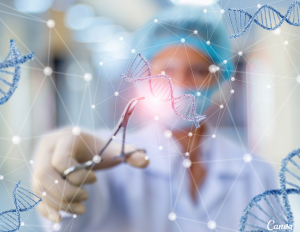
The Transgenic and Gene Targeting Facility (TGTF) is located at Clinical Research Centre (CRC), MD11, in NUS. The facility is equipped with Leica AM6000 micromanipulator, Eppendorf FemtoJet micro-injector, micro-pipette fabrication devices and tissue culture system.
The purpose of the TGTF is to provide technologically advanced and efficient mouse/rat services to the biomedical research community in Singapore. To modify mouse/rat genomes, we perform CRISPR/Cas9 (with or without DNA) injection for gene targeting or traditional DNA microinjection for transgenic services. We perform gene targeting in ES cells followed by blastocyst injection to generate chimeric mice. TGTF also offers assisted reproductive services, including embryo and sperm cryopreservation and storage, in vitro fertilization and rederivation and rescue of mouse/rat lines.
Facility Head
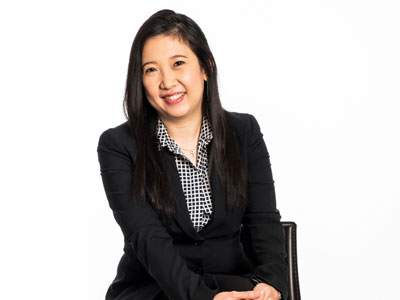
Dr. Yvonne Tay
CSI Singapore
yvonnetay[at]nus.edu.sg
Key Operator
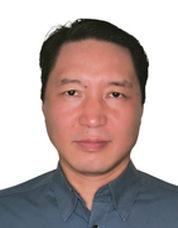
Yu Shuizhou
Senior Laboratory Executive
csiyus[at]nus.edu.sg
TGTF – MD6, 13S, Bench-22
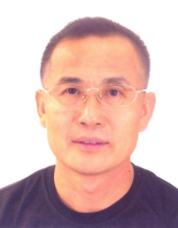
Shi Jizhong Edward
Senior Laboratory Executive
csisj[at]nus.edu.sg
TGTF – MD6, 13S, Bench-22
Services
TGTF provides conventional transgenic mouse service by injecting transgenic DNA fragments or BAC DNA into mouse pronuclei. The injected DNA will be randomly integrated into the mouse genome; therefore, transgenic mice will be confirmed by genotyping only. We do not guarantee gene expression from the injected DNA fragment.
- The transgenic DNA construct should be designed and prepared by the PI’s lab. If requested by the PI’s lab, transgene DNA preparation can be done at TGTF at additional cost.
- 3 transgenic founders are guaranteed by genotyping if the transgenic DNA fragment is purified by TGTF.
- Up to 300 embryos will be injected or 30 pups provided whichever comes first if user prepare DNA fragment or circular BAC DNA.
- The turnaround time will be 3-4 months from the first microinjection.
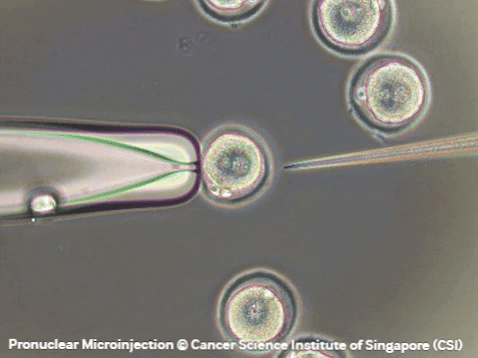
Direct and precise modification of the genomes of mouse and rat embryos. CRISPR/Cas9 technology has revolutionized rodent model production and is evolving rapidly. It has the following key advantages:
- Short turnaround time: CRISPR/Cas9 technology reduces timelines to 4-6 months, compared to ES cell gene targeting method.
- Reduced cost: CRISPR/Cas9 technology reduces cost compared to the traditional Tg method.
- Broad range of genome modifications: CRISPR/Cas9 technology is able to generate a broad range of genomic modifications (e.g. indels, point mutations, null KO, KI and cKO alleles).
Success rate and projected timeline:
- The successful rate for our CRISPR/Cas9 projects is > 90%.
- Founders can be generated in as few as 3-4 months, depending on allele complexity.
- Typically, WT C57BL/6J embryos are used for microinjection; other preferences will be accommodated if possible.
TGTF will harvest blastocysts from uteri of up to 5 pregnant E5 females. Blastocysts will be rinsed with M2 medium and placed onto mitomycin-C treated SNL feeder cell layers in embryo growth media with LIF. The blastocysts will be grown ex vivo for 4-5 days, when inner cell mass (ICM) will have expanded. ICM cells will be disaggregated and seeded in 96-well plate. TGTF will freeze 4 ES cell clones for customers and offer 106 ES cells of each clone for karyotype analysis by the PI’s lab.
- The 4 best ES cell clones after characterization will be frozen for the PI’s lab, additional clones can be requested at extra cost.
- 5 female mice at the age of 28-30 days are required.
- The PI’s lab needs to provide 5 males at good breeding age, 3-8 months.
- The PI’s lab should prepare for karyotype analysis 3 weeks later when the ES cells are available
- TGTF is happy to 1) perform karyotype analysis for the ES cells clones; 2) inject the ES cells into blastocyst to generate chimeras for further validation for the PI’s lab at additional cost.
Gene targeting in ES cells utilizes homologous recombination to replace targeted regions of endogenous DNA with engineered DNA in ES cell lines to generate knock-out, knock-in, point mutant or conditional alleles.
- TGTF will pick up to 192 clones (2 x 96-well plates) and perform expansion of up to 6 clones. Germline transmission is not guaranteed.
- Gene targeted ES cell clones can be delivered to the PI’s lab for down-stream experiments or used to generate chimeras at TGTF.
- Clones can be generated in ~5-10 weeks from the electroporation date.
Optional add-on service requests:
- Additional 96-well plates can be seeded upon request.
- ES cell expansion of additional colonies from 96-well plates can be performed upon request.
- Cytogenetic analysis of additional ES cell clones before microinjection.
Chimera mice will be generated by blastocyst injection of gene targeted ES cells . Up to 200 blastocysts will be injected with 2 positive ES cell clones for each project. For gene targeted ES cells generated at TGTF, we will inject an additional clone, into up to 100 blastocysts if no chimera mice were obtained from injection of the first 2 clones.
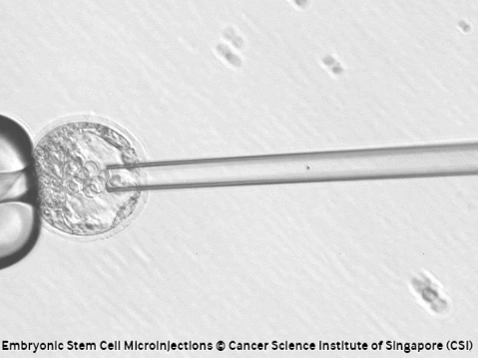
We default freeze 8-10 straws of sperm from one donor of each line. Two male mice at the age between 3-8 months are needed. Males with previous mating history are preferred.
- QC option 1: Visual assessment of viability and activity of the freeze-thawed sperm.
- QC option 2: Freeze-thaw sperm, IVF, embryos transferred into 1-5 surrogate mothers till pups born and genotyping.
Embryo Cryopreservation: 180-220 embryos at 2-cell stage will be cryopreserved in 4-5 cryovials for the PI’s lab. The PI’s lab has the following options:
- Natural mating: the PI’s lab provides around 10 males at breeding age and 10-15 females at the age of 3-4 weeks.
- IVF option 1: the PI’s lab provides 2 male mice with breeding history and up to 10 females at the age of 3-4 weeks.
- IVF option 2: the PI’s lab provides 2 male mice with breeding history and TGTF provides up to 10 females at the age of 3-4 weeks.
- QC option 1: Visual assessment of embryo viability.
- QC option 2: Embryos transferred into 1-5 surrogate mothers till pups born and genotyped.
Sperm and embryo cryobank storage service provides the PI’s labs a convenient, safe, short/long term storage of their mouse lines at a very low cost.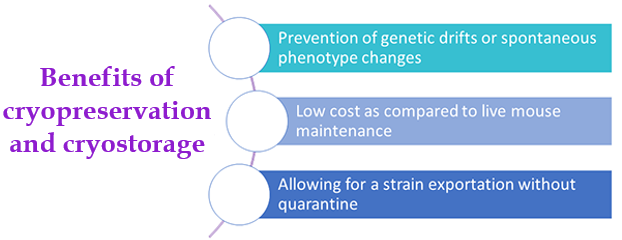
Rederivation involves the revival of mouse strains from cryopreserved sperm or embryos, the rescue of mouse lines from sterile old male mice, or the clean up of dirty mouse strains. The successful rate at TGTF is over 99%. The PI’s lab has the following options:
- From cryopreserved embryos: The PI’s lab provides 3 vials of cryopreserved embryos.
- Natural mating: The PI’s lab provides 7-10 male mice at breeding age, 3-8 months, and 10-15 female mice at 28-30 days.
- In vitro fertilization (IVF) (1): The PI’s lab provides 2 male mice at 3 months old or older as sperm donors, and 10-15 female mice at 28-30 days as egg donors.
- IVF (2): The PI’s lab provides 2 male mice at 3 months old or older. TGTF provides 15 WT female mice at 28-30 days.
- IVF (3): The PI’s lab provides no less than 3 straws of cryopreserved sperm and their sperm cryopreservation protocol.* TGTF provides 15 WT female mice at 28-30 days. (*In the event that the sperm cryopreservation was not done at TGTF, the PI’s lab should provide the sperm cryopreservation protocol for corresponding adjustment at TGTF when thawing the cryopreserved sperm for better fertilization rate. If no viable sperm are present, TGTF cannot guarantee successful rederivation.)
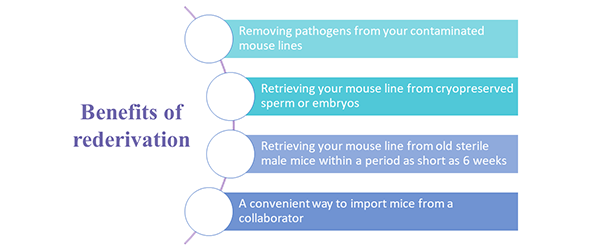
We will transfer embryos (frozen or fresh) into pseudopregnant female’s oviducts or uterus for gestation. Animals resulting will be transferred to the PI’s lab for genotyping and breeding.
TGTF will use fresh or previously frozen sperm to fertilize oocytes obtained from up to 10 superovulated females either from TGTF or from the PI’s lab. Embryos surviving to the two-cell stage can be transferred to the PI’s lab or implanted into pseudopregnant females for gestation or frozen for later implantation.
1. Aled O’Neill, Desmond Chin, Darren Tan, A’Qilah Banu Bte Abdul Majeed, Ayako Nakamura-Ishizu, and Toshio Suda. Thrombopoietin Maintains Cell Numbers of Hematopoietic Stem and Progenitor Cells With Megakaryopoietic Potential. Haematologica. 2020 Jun 11:haematol.2019.241406. doi: 10.3324/haematol.2019.241406.
2. Pavithra Shyamsunder, Mahalakshmi Shanmugasundaram, Anand Mayakonda, Pushkar Dakle, Weoi Woon Teoh, Lin Han, Deepika Kanojia, Mei Chee Lim, Melissa Fullwood, Omer An, Henry Yang, Jizhong Shi, Mohammad Zakir Hossain, Vikas Madan, H Phillip Koeffler. Identification of a Novel Enhancer of CEBPE Essential for Granulocytic Differentiation. Blood. 2019 Jun 6;133(23):2507-2517. doi: 10.1182/blood.2018886077.
3. Junichi Matsuo, Shunichi Kimura, Akihiro Yamamura, Cai Ping Koh, Md Zakir Hossain, Dede Liana Heng, Kazuyoshi Kohu, Dominic Chih-Cheng Voon, Hiroshi Hiai, Michiaki Unno, Jimmy Bok Yan So, Feng Zhu, Supriya Srivastava, Ming Teh, Khay Guan Yeoh, Motomi Osato, Yoshiaki Ito. Identification of Stem Cells in the Epithelium of the Stomach Corpus and Antrum of Mice. Gastroenterology. 2017 Jan;152(1):218-231.e14. doi: 10.1053/j.gastro.2016.09.018.
4. Desmond Wai Loon Chin, Naoko Watanabe-Okochi, Chelsia Qiuxia Wang, Vinay Tergaonkar, Motomi Osato. Mouse models for core binding factor leukemia. Leukemia. 2015 Oct;29(10):1970-80. doi: 10.1038/leu.2015.181.
Other Services
Dry shipping is a convenient method for transportation or distribution of cryopreserved sperm or embryo internationally but sperm or embryo handling must be extremely careful for protection of the precious mouse lines in the straws or cryovials.
- TGTF will communicate with the PI’s lab for detailed information of the lab and World Courier and the recipient facility for shipping logistics, export documentation, and protocols to ensure successful recovery of cryopreserved stock.
- Dry shipper can be rented from TGTF for the convenience of the PI’s labs.
The PI’s lab will be provided with genotyping results in PPT slides with corresponding interpretations.
- PCR: Tail snipping, lysis and PCR, gel run per sample
- RFLP, per reaction per sample
- T7E1 test, per sample
- Surveyor test, per sample
- Sequencing: from tail snipping to sequencing, per sample.
- Re-snipping for 2nd round of genotyping
- Oocyte cumulus complexes from 5 mice
- Blastocysts from 5 mice
- 2-cell stage embryo from 5 mice
- Sperm/caudal epididymides
- C57BL/6
- CD1 E
- PB1 10 ml
- DAP213 1 ml
- mHTF 10 ml
- KSOM 4 ml
- gCPA 1 ml
Customized Services
- Vasectomy
- Ovary implantation
- Specific requests can be discussed
- C57BL/6
- CD1 E
- Other mouse strains from the PI’s lab
Please contact us (Edward Shi: csisj@nus.edu.sg) for further information and price list.

